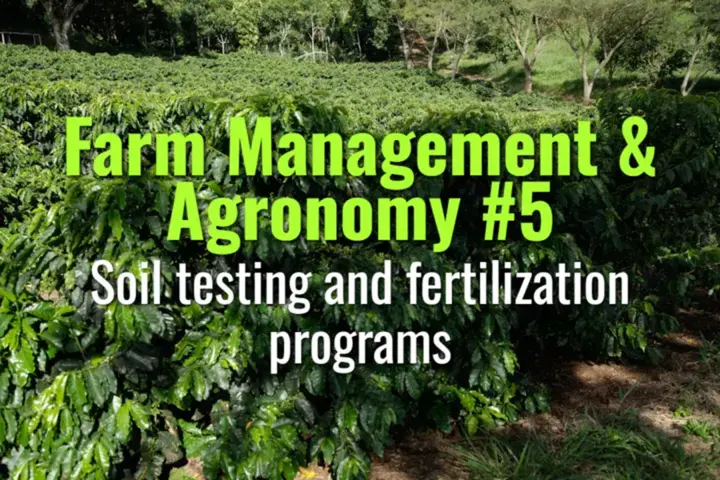Soil testing and fertilization programs
This topic explains the role of soil testing in coffee farming, how fertilization programs are designed, and why balanced nutrient management is essential for productivity and quality.
- Coffee Basics Nerds
- 2 min read
Article 5 of 12 in Farm Management & Agronomy/

Importance of Soil Testing
- Provides a scientific basis for fertilization decisions.
- Identifies nutrient deficiencies, pH imbalances, and organic matter levels.
- Prevents over-fertilization, reducing costs and environmental damage.
Soil Sampling Process
- Collect soil samples from different sections of the farm (depth 0–20 cm).
- Mix into a composite sample for laboratory analysis.
- Analyze for pH, macronutrients (N, P, K, Ca, Mg, S), and micronutrients (Fe, Zn, B, Mn, Cu).
- Interpret results with agronomist support.
Key Parameters
- pH: Coffee prefers slightly acidic soils (5.5–6.5).
- Organic matter: Enhances nutrient availability and water retention.
- CEC (cation exchange capacity): Indicates soil’s ability to hold nutrients.
Fertilization Programs
1. Macronutrient Management
- Nitrogen (N): For vegetative growth; applied before and after flowering.
- Phosphorus (P): Supports root growth and flowering.
- Potassium (K): Critical during fruit filling and ripening.
- Calcium (Ca) & Magnesium (Mg): Strengthen cell walls and photosynthesis.
2. Micronutrient Management
- Boron (B): Crucial for flowering and seed development.
- Zinc (Zn): Affects leaf size and growth.
- Iron (Fe): Prevents chlorosis.
- Copper (Cu): Supports lignin synthesis and disease resistance.
3. Application Methods
- Soil application: Granular fertilizers, compost, manure.
- Foliar sprays: Quick correction of micronutrient deficiencies.
- Organic fertilizers: Compost, coffee pulp, and green manures improve long-term soil health.
Fertilization Scheduling
- Split applications across the season (pre-flowering, post-flowering, fruit filling).
- Adapt to rainfall cycles to minimize nutrient leaching.
- Adjust programs annually based on soil test results.
Best Practices
- Integrate organic and inorganic sources for balance.
- Use mulch and cover crops to recycle nutrients.
- Monitor plant tissue for hidden deficiencies.
- Avoid blanket fertilizer use without testing.
Lasting Importance
Soil testing and fertilization programs are cornerstones of sustainable agronomy. They ensure coffee plants receive the right nutrients at the right time, improving yields, enhancing cup quality, and protecting the environment from overuse of agrochemicals.